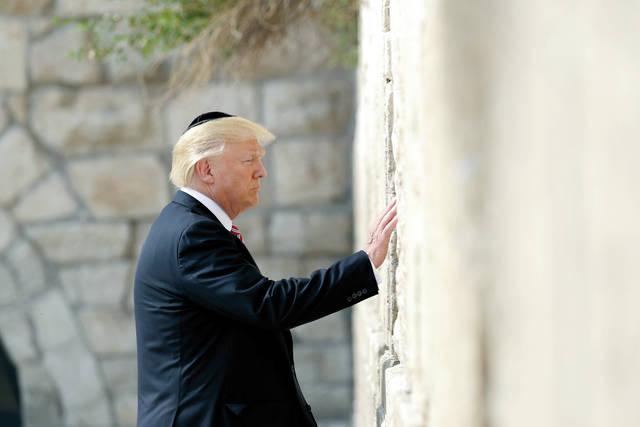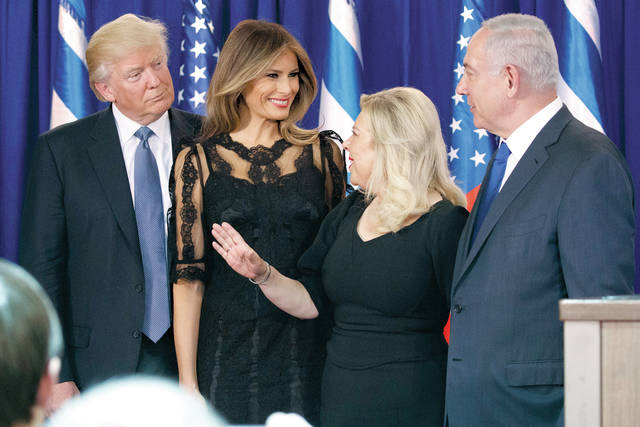Questions about Russia chase Trump during first Israel visit
JERUSALEM — President Donald Trump solemnly placed a note in the ancient stones of Jerusalem’s Western Wall on Monday, sending a signal of solidarity to an ally he’s pushing to work harder toward peace with the Palestinians. But his historic gesture— and his enthusiastic embrace of Israel’s leader — were shadowed even here by reminders of Trump’s tumult back home
ADVERTISING
In this second stop on his maiden foreign trip, Trump unexpectedly offered a new defense of his disclosure of classified information to Russian diplomats in a recent Oval Office meeting. Standing alongside Israeli Prime Minister Benjamin Netanyahu, he argued he never mentioned Israel, the source of the classified intelligence, according to various officials — something he has not been accused of doing.
“I never mentioned the word or the name Israel,” he told reporters. “So you have another story wrong.”
The moment was abrupt interruption of an otherwise warm and smooth welcome for Trump to the Holy Land. After years of butting heads with Trump’s predecessor, Netanyahu celebrated a new American president’s arrival as a moment of hope in the stalled peace talks between Israel and Palestinians. Trump, arriving from Saudi Arabia, declared he saw the possibility of new alignment of Muslim nations and Israel against a shared foe — Iran.
“There is a growing realization among your Arab neighbors that they have common cause with you in the threat posed by Iran,” he said, at a welcome meeting with President Rueven Rivlin.
The White House has said it doesn’t expect any sort of breakthrough on the peace process on this trip. But Trump’s unconventional approach to diplomacy has raised hopes that he may be well positioned to jumpstart talks bogged down by entrenched interests and ancient enmity.
Welcoming Trump, Netanyahu said, “I also look forward to working closely with you to advance peace in our region, because you have noted so succinctly that common dangers are turning former enemies into partners.”
“It won’t be simple,” Netanyahu said. “But for the first time in many years — and, Mr. President, for the first time in my lifetime — I see a real hope for change.”
Trump is to travel Tuesday to Bethlehem to visit with Palestinian leader Mahmoud Abbas in the West Bank. He’ll later to lay a wreath at the Yad Vashem, a Holocaust memorial, and deliver a speech at the Israeli Museum.
Trump’s visit was laden with religious symbolism. He toured the Church of the Holy Sepulchre, which by Christian tradition is where Jesus was crucified and the location of his tomb. Wearing black skull cap, he became the first sitting president to visit the Western Wall in Jerusalem’s Old City, the most holy site at which Jews can pray.
Trump was joined by first lady Melania Trump, his son-in-law Jared Kushner and daughter Ivanka Trump. The family was separated by gender. The president and Kushner visited one side, while the first daughter and first lady visited a portion of the site reserved for women. Trump approached alone and placed his hand on the stone.
The visit raised questions about whether the U.S. would indicate the site is Israeli territory. The U.S. has never recognized Israeli sovereignty over parts of the Old City seized in the 1967 war.
The White House struggled to answer the question. Ambassador to the United Nations Nikki Haley declared the site part of Israel, while Secretary of State Rex Tillerson on Monday dodged.
“The wall is part of Jerusalem,” he said, declaring only an undeniable fact accepted by all sides.
Trump never commented.
The president did step into another fraught subject: his recent disclosure of classified information to Russian diplomats, seemingly violating an intelligence-sharing agreement with Israel.
Netanyahu played it down, saying that U.S.-Israeli intelligence cooperation is “terrific” while attempting to dismiss concerns that the incident violated a confidentiality agreement. But it was another stark reminder for the president that his troubles at home, including the investigation of his ties to Russia and his firing of FBI Director James Comey, have followed him across the ocean on his multi-nation journey.
Gulf Arab countries long have been suspicious about Iran, and the Obama administration’s nuclear negotiations furthered their worries about Iran’s regional intentions.
Trump is seeking to ease concerns that his policies won’t be as beneficial to Israel as once believed. He has taken a tougher line on settlements than Israeli officials had expected, urging restraint though not calling for a full halt to construction. Trump has also retreated from a campaign pledge to move the U.S. Embassy in Israel from Tel Aviv to Jerusalem, bending to the same diplomatic and security concerns as other presidents who have made similar promises.




